Healthcare Innovation: NantHealth Technologies and Future Trends
VerifiedAdded on 2023/01/24
|13
|971
|25
Presentation
AI Summary
This presentation provides an overview of NantHealth, a next-generation healthcare technology company, and its innovative solutions designed to enhance patient care and treatment efficiency. The presentation focuses on two key technologies: GPS Cancer, which integrates DNA, RNA, and proteomics data to provide detailed cancer profiles for personalized treatment, and Eviti Connect, a decision support system that aligns patients, healthcare providers, and insurers to optimize treatment plans and outcomes. The presentation explains how these technologies leverage real-time data to improve outcome-focused planning, reduce hospital readmissions, and facilitate coordinated care. Furthermore, it discusses the impact of these technologies on the future of healthcare, emphasizing patient involvement in decision-making, personalized treatments, and increased efficiency. The presentation concludes by highlighting the significance of these technologies in advancing the healthcare industry.
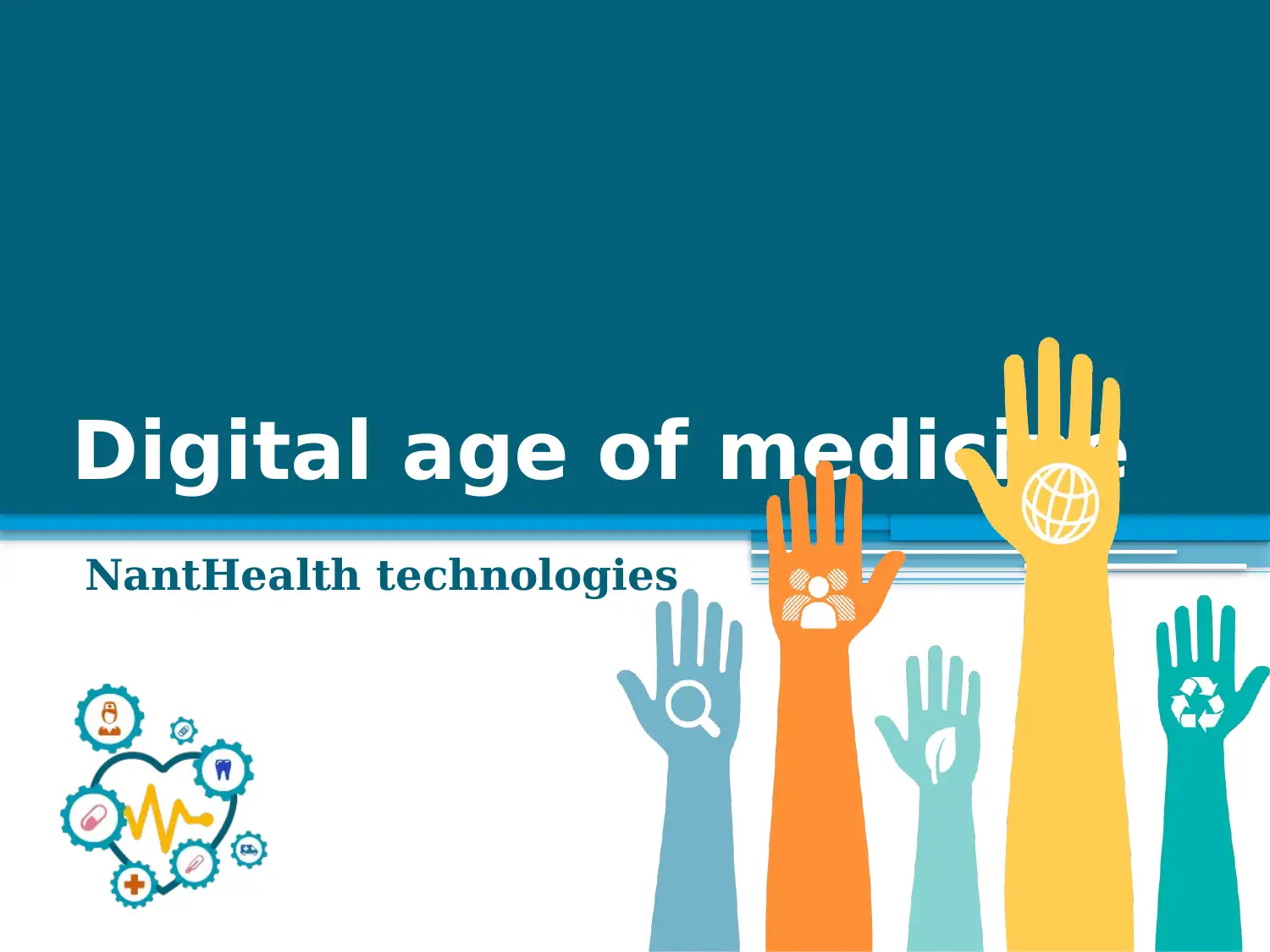
Digital age of medicine
NantHealth technologies
NantHealth technologies
Paraphrase This Document
Need a fresh take? Get an instant paraphrase of this document with our AI Paraphraser
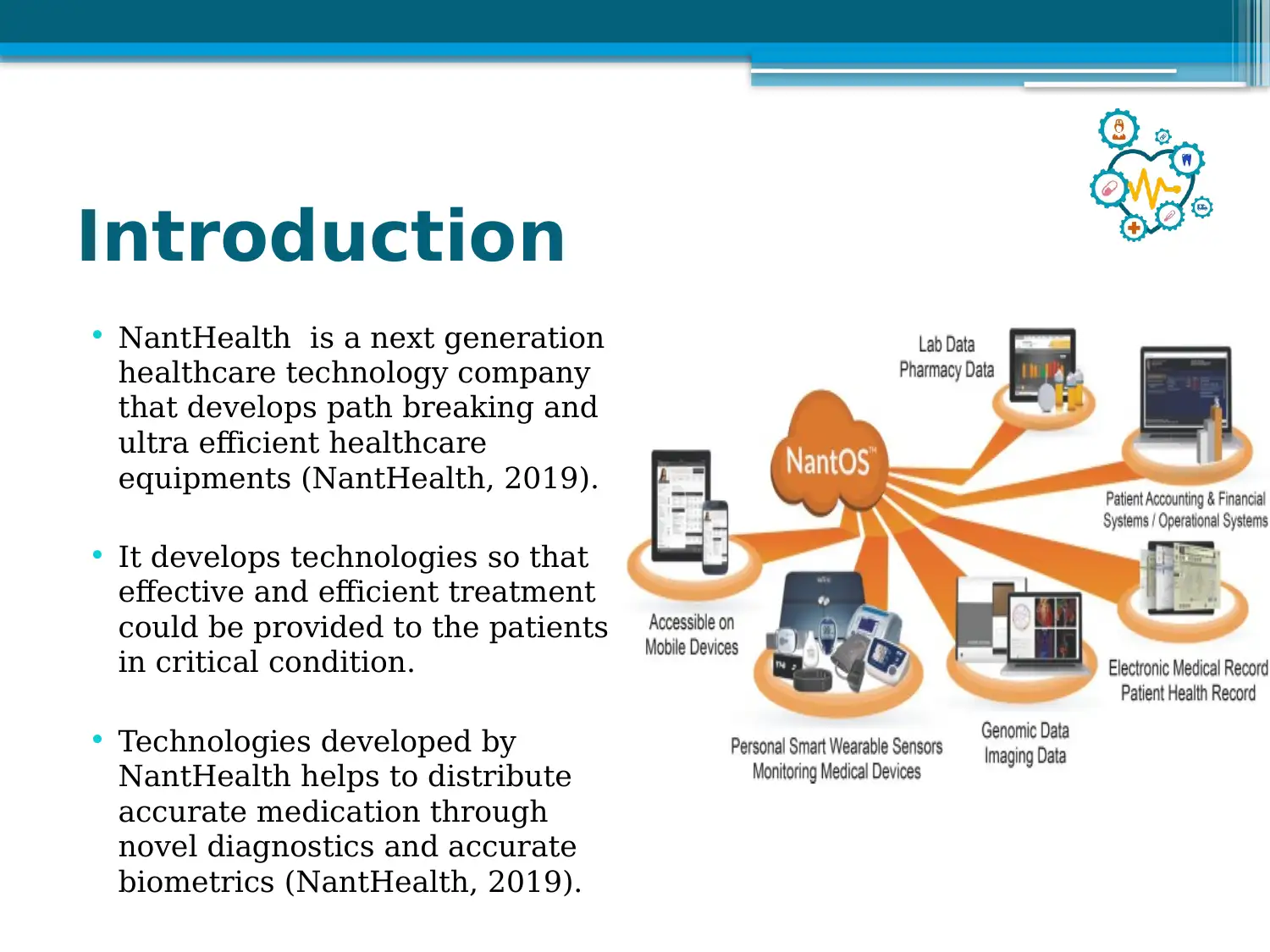
Introduction
• NantHealth is a next generation
healthcare technology company
that develops path breaking and
ultra efficient healthcare
equipments (NantHealth, 2019).
• It develops technologies so that
effective and efficient treatment
could be provided to the patients
in critical condition.
• Technologies developed by
NantHealth helps to distribute
accurate medication through
novel diagnostics and accurate
biometrics (NantHealth, 2019).
• NantHealth is a next generation
healthcare technology company
that develops path breaking and
ultra efficient healthcare
equipments (NantHealth, 2019).
• It develops technologies so that
effective and efficient treatment
could be provided to the patients
in critical condition.
• Technologies developed by
NantHealth helps to distribute
accurate medication through
novel diagnostics and accurate
biometrics (NantHealth, 2019).
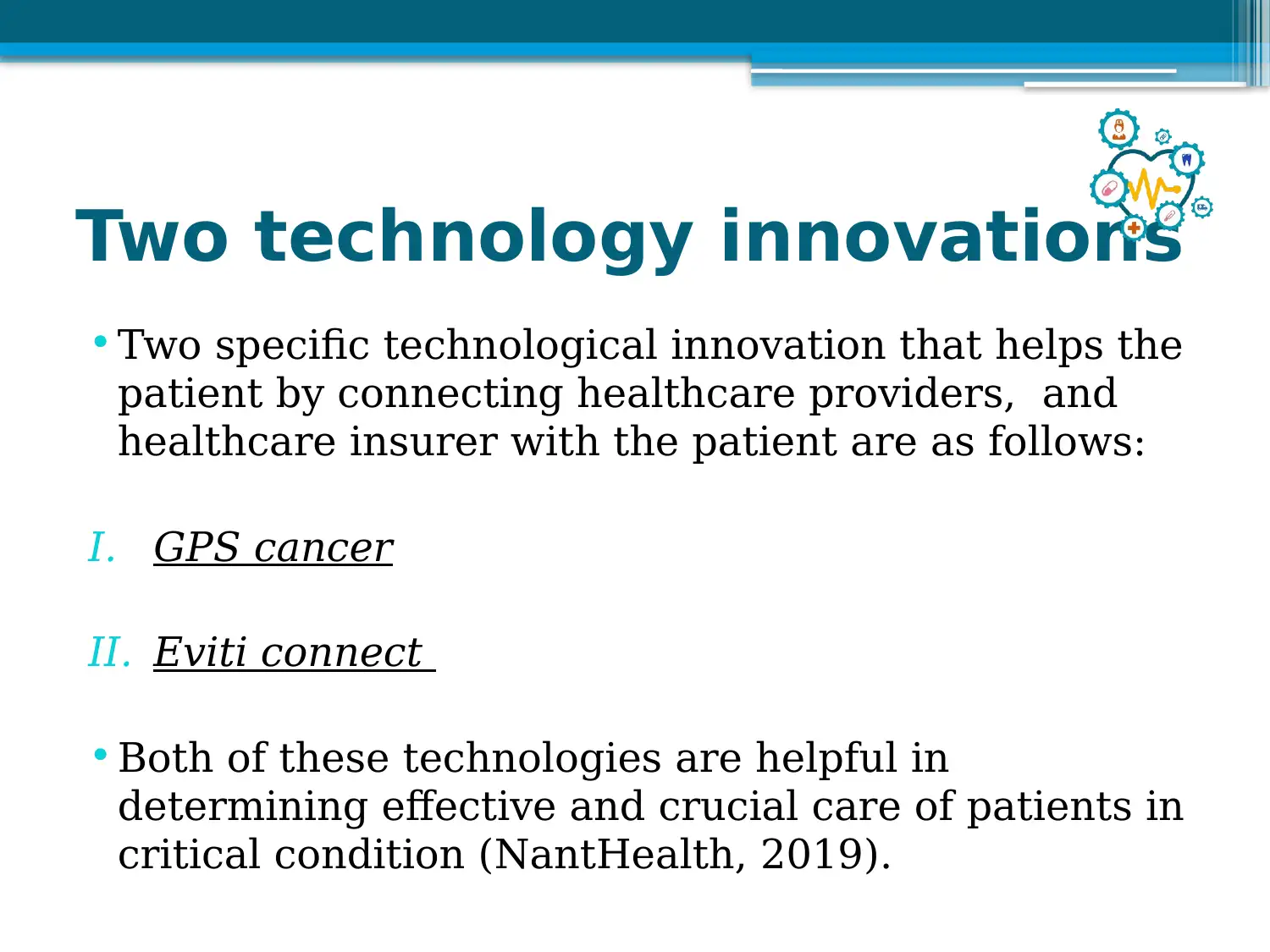
Two technology innovations
• Two specific technological innovation that helps the
patient by connecting healthcare providers, and
healthcare insurer with the patient are as follows:
I. GPS cancer
II. Eviti connect
• Both of these technologies are helpful in
determining effective and crucial care of patients in
critical condition (NantHealth, 2019).
• Two specific technological innovation that helps the
patient by connecting healthcare providers, and
healthcare insurer with the patient are as follows:
I. GPS cancer
II. Eviti connect
• Both of these technologies are helpful in
determining effective and crucial care of patients in
critical condition (NantHealth, 2019).
⊘ This is a preview!⊘
Do you want full access?
Subscribe today to unlock all pages.

Trusted by 1+ million students worldwide
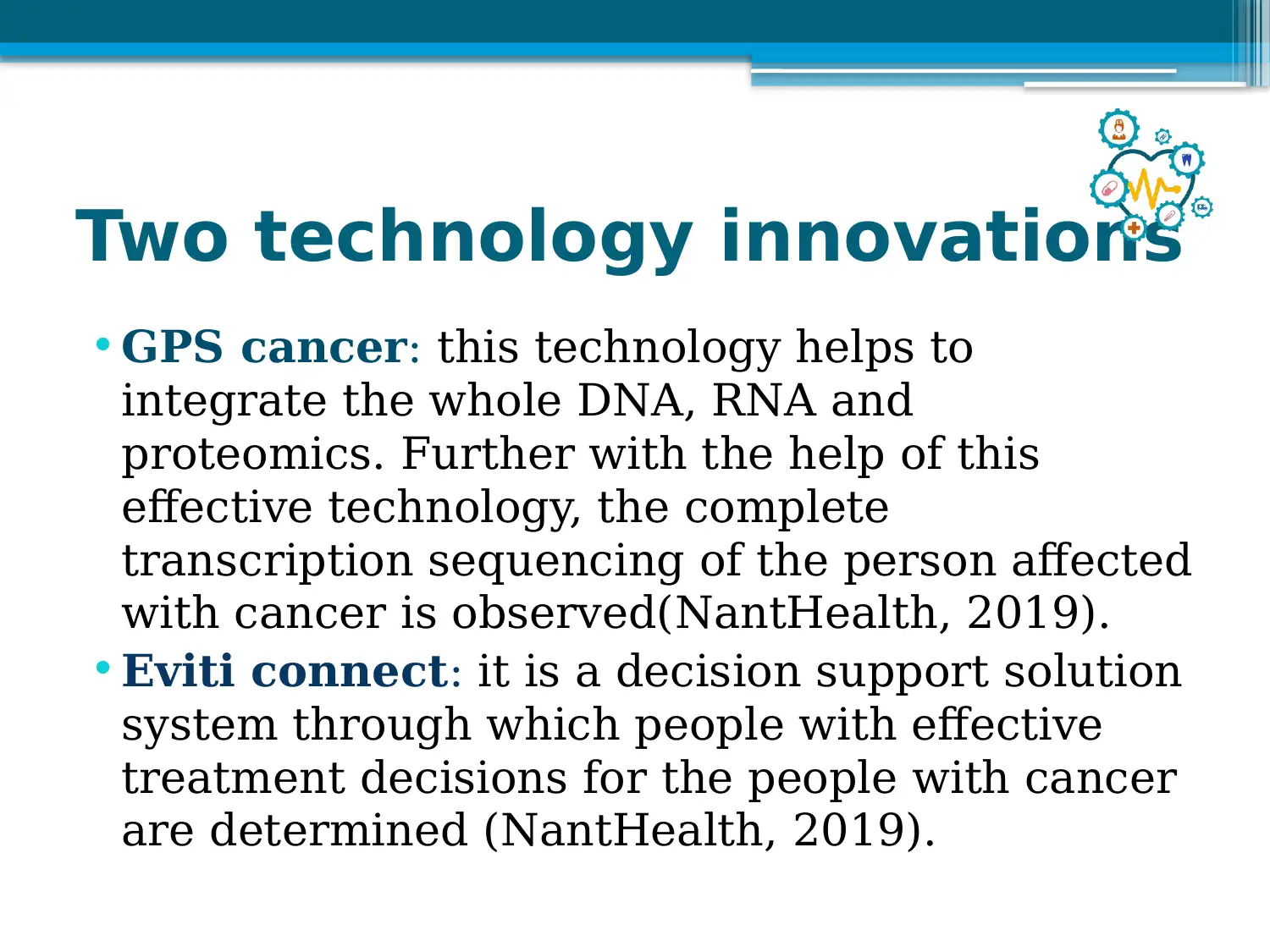
Two technology innovations
• GPS cancer: this technology helps to
integrate the whole DNA, RNA and
proteomics. Further with the help of this
effective technology, the complete
transcription sequencing of the person affected
with cancer is observed(NantHealth, 2019).
• Eviti connect: it is a decision support solution
system through which people with effective
treatment decisions for the people with cancer
are determined (NantHealth, 2019).
• GPS cancer: this technology helps to
integrate the whole DNA, RNA and
proteomics. Further with the help of this
effective technology, the complete
transcription sequencing of the person affected
with cancer is observed(NantHealth, 2019).
• Eviti connect: it is a decision support solution
system through which people with effective
treatment decisions for the people with cancer
are determined (NantHealth, 2019).
Paraphrase This Document
Need a fresh take? Get an instant paraphrase of this document with our AI Paraphraser
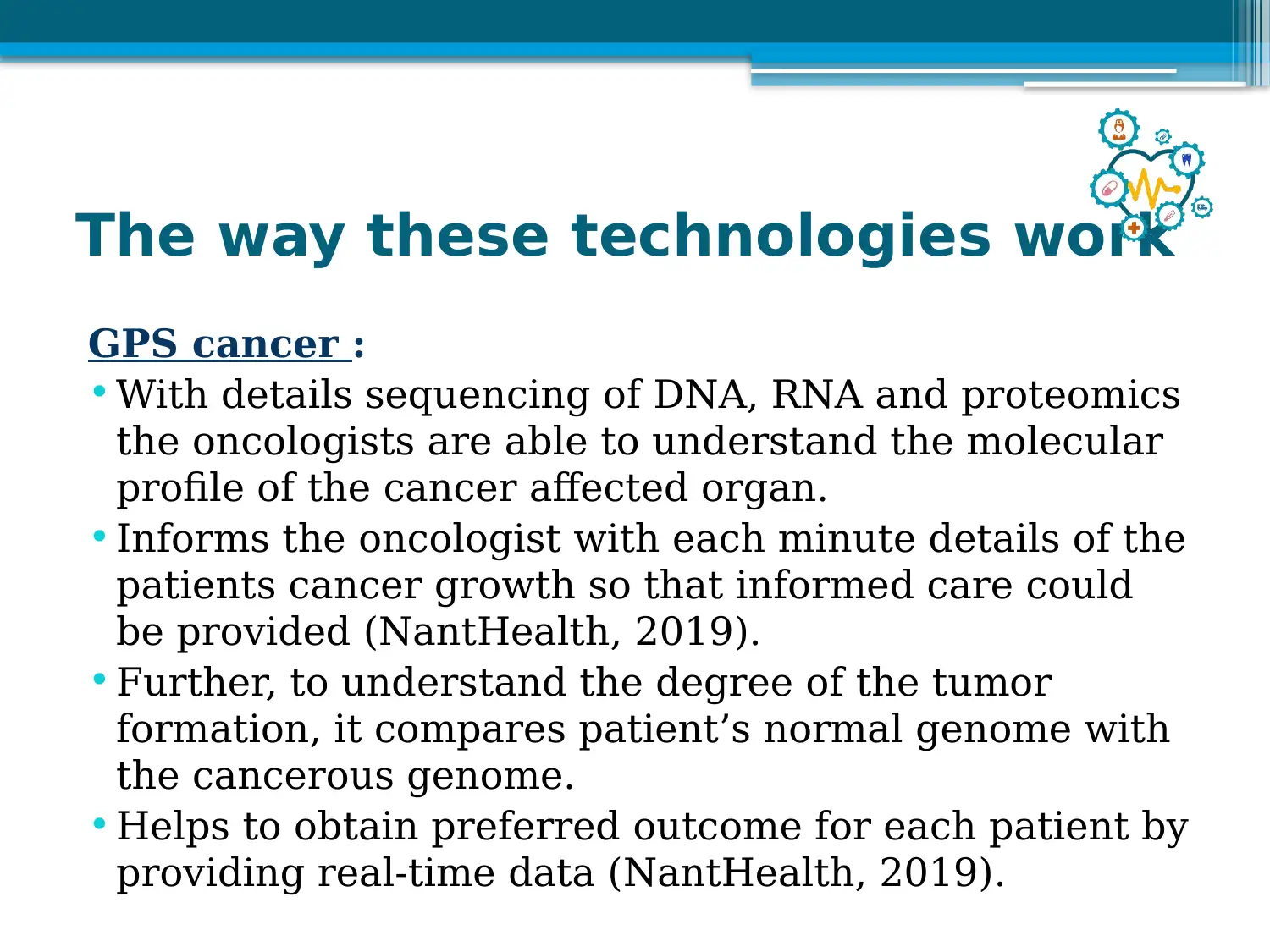
The way these technologies work
GPS cancer :
• With details sequencing of DNA, RNA and proteomics
the oncologists are able to understand the molecular
profile of the cancer affected organ.
• Informs the oncologist with each minute details of the
patients cancer growth so that informed care could
be provided (NantHealth, 2019).
• Further, to understand the degree of the tumor
formation, it compares patient’s normal genome with
the cancerous genome.
• Helps to obtain preferred outcome for each patient by
providing real-time data (NantHealth, 2019).
GPS cancer :
• With details sequencing of DNA, RNA and proteomics
the oncologists are able to understand the molecular
profile of the cancer affected organ.
• Informs the oncologist with each minute details of the
patients cancer growth so that informed care could
be provided (NantHealth, 2019).
• Further, to understand the degree of the tumor
formation, it compares patient’s normal genome with
the cancerous genome.
• Helps to obtain preferred outcome for each patient by
providing real-time data (NantHealth, 2019).
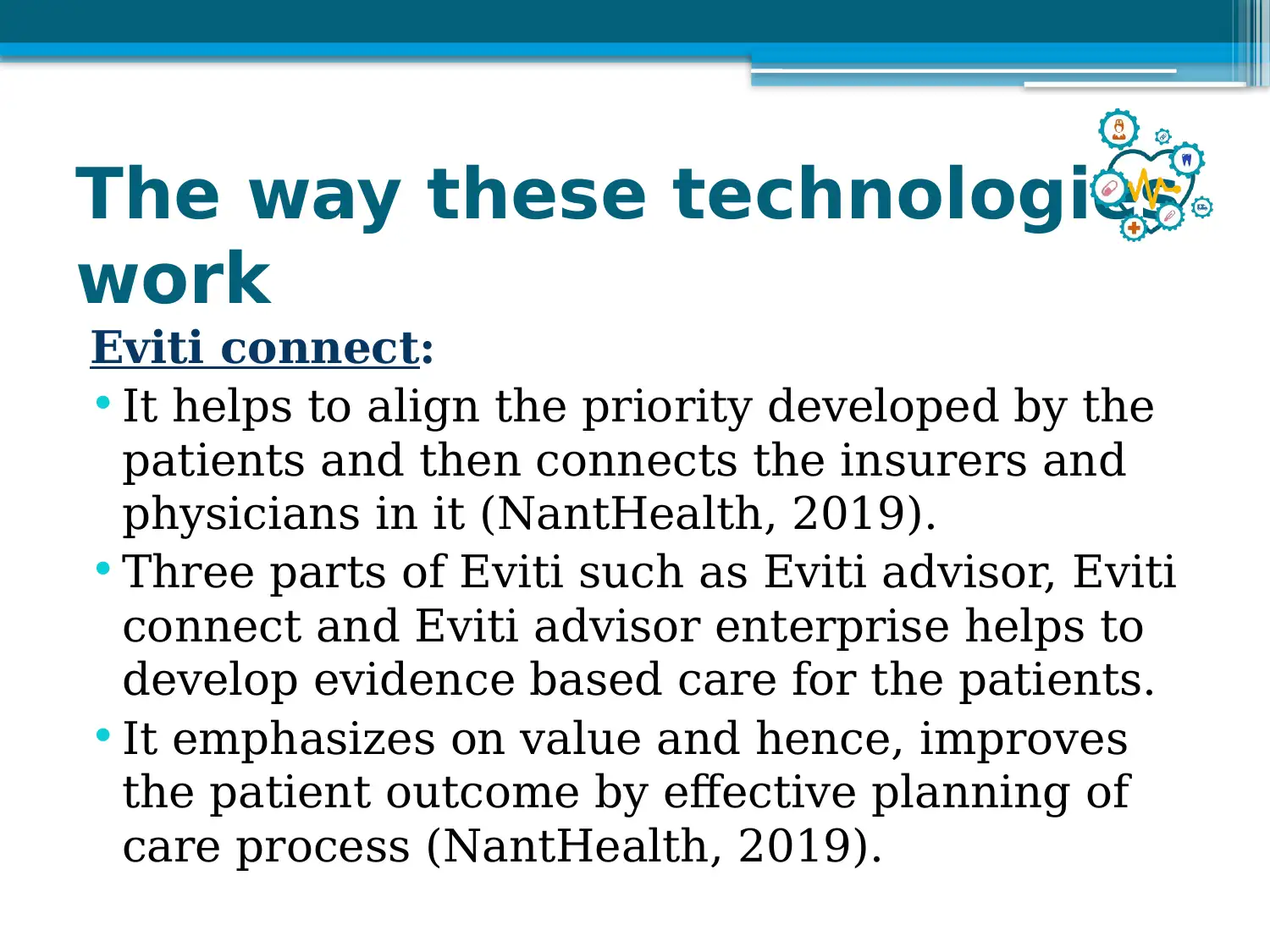
The way these technologies
work
Eviti connect:
• It helps to align the priority developed by the
patients and then connects the insurers and
physicians in it (NantHealth, 2019).
• Three parts of Eviti such as Eviti advisor, Eviti
connect and Eviti advisor enterprise helps to
develop evidence based care for the patients.
• It emphasizes on value and hence, improves
the patient outcome by effective planning of
care process (NantHealth, 2019).
work
Eviti connect:
• It helps to align the priority developed by the
patients and then connects the insurers and
physicians in it (NantHealth, 2019).
• Three parts of Eviti such as Eviti advisor, Eviti
connect and Eviti advisor enterprise helps to
develop evidence based care for the patients.
• It emphasizes on value and hence, improves
the patient outcome by effective planning of
care process (NantHealth, 2019).
⊘ This is a preview!⊘
Do you want full access?
Subscribe today to unlock all pages.

Trusted by 1+ million students worldwide
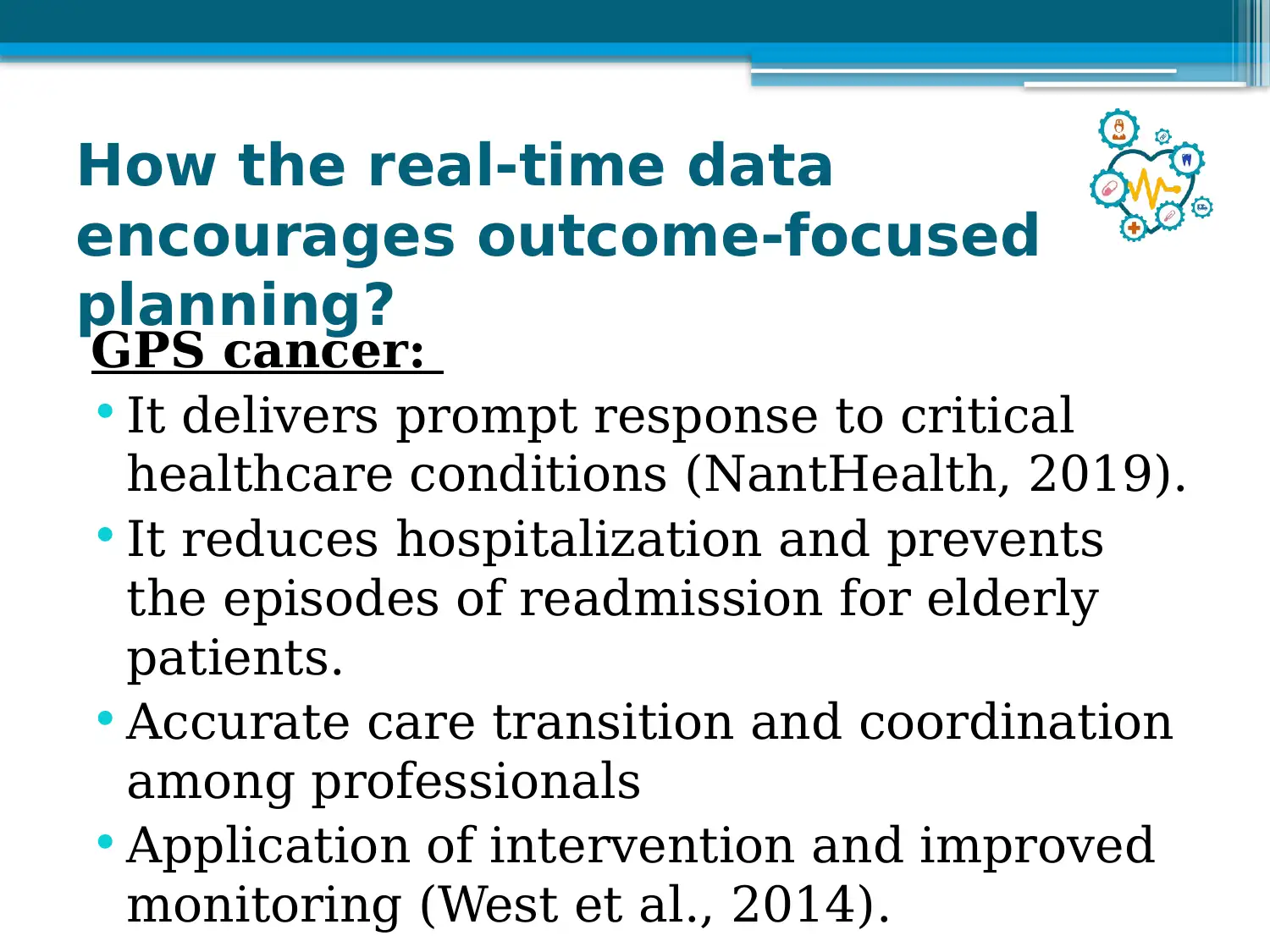
How the real-time data
encourages outcome-focused
planning?
GPS cancer:
• It delivers prompt response to critical
healthcare conditions (NantHealth, 2019).
• It reduces hospitalization and prevents
the episodes of readmission for elderly
patients.
• Accurate care transition and coordination
among professionals
• Application of intervention and improved
monitoring (West et al., 2014).
encourages outcome-focused
planning?
GPS cancer:
• It delivers prompt response to critical
healthcare conditions (NantHealth, 2019).
• It reduces hospitalization and prevents
the episodes of readmission for elderly
patients.
• Accurate care transition and coordination
among professionals
• Application of intervention and improved
monitoring (West et al., 2014).
Paraphrase This Document
Need a fresh take? Get an instant paraphrase of this document with our AI Paraphraser
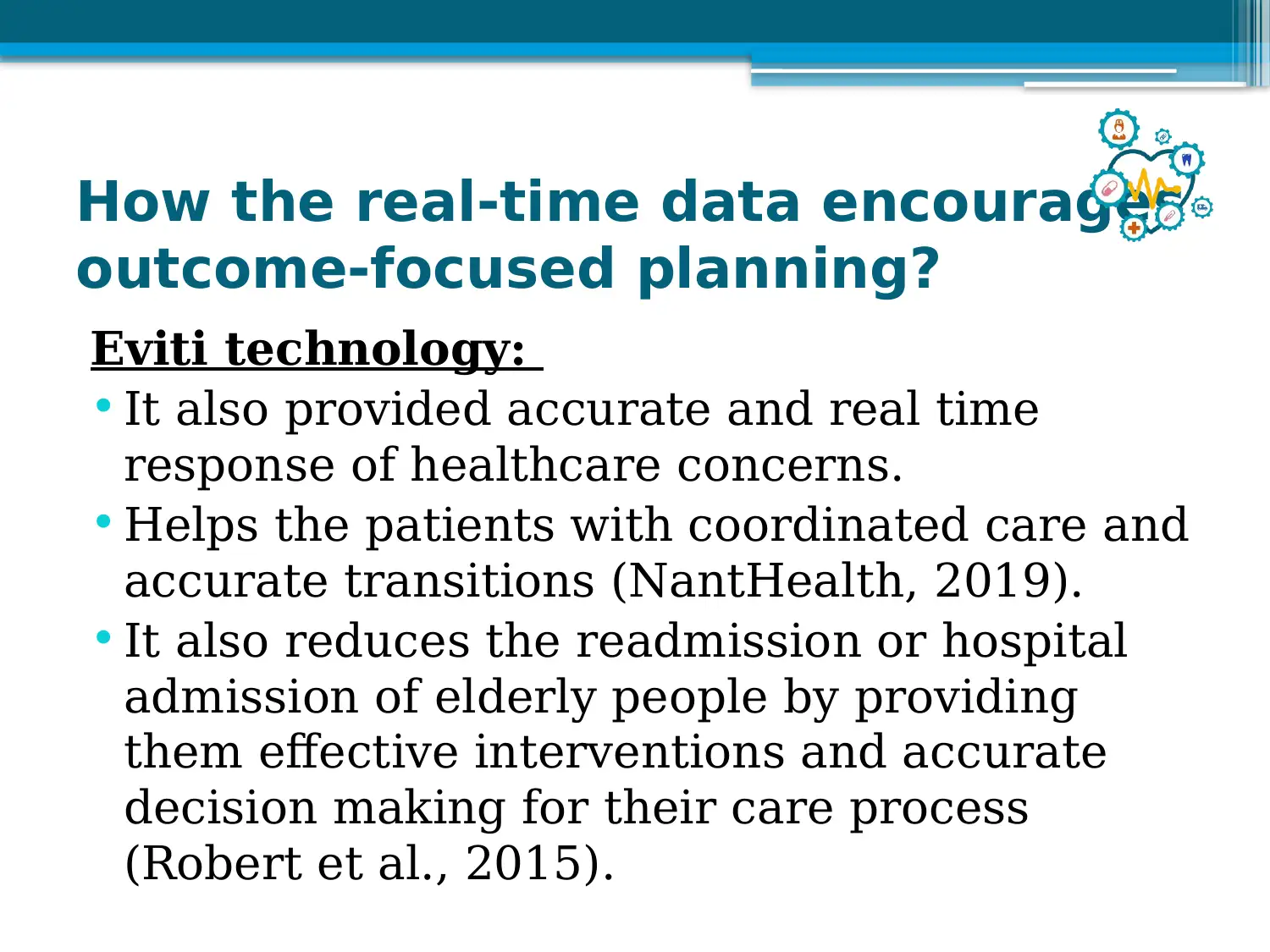
How the real-time data encourages
outcome-focused planning?
Eviti technology:
• It also provided accurate and real time
response of healthcare concerns.
• Helps the patients with coordinated care and
accurate transitions (NantHealth, 2019).
• It also reduces the readmission or hospital
admission of elderly people by providing
them effective interventions and accurate
decision making for their care process
(Robert et al., 2015).
outcome-focused planning?
Eviti technology:
• It also provided accurate and real time
response of healthcare concerns.
• Helps the patients with coordinated care and
accurate transitions (NantHealth, 2019).
• It also reduces the readmission or hospital
admission of elderly people by providing
them effective interventions and accurate
decision making for their care process
(Robert et al., 2015).
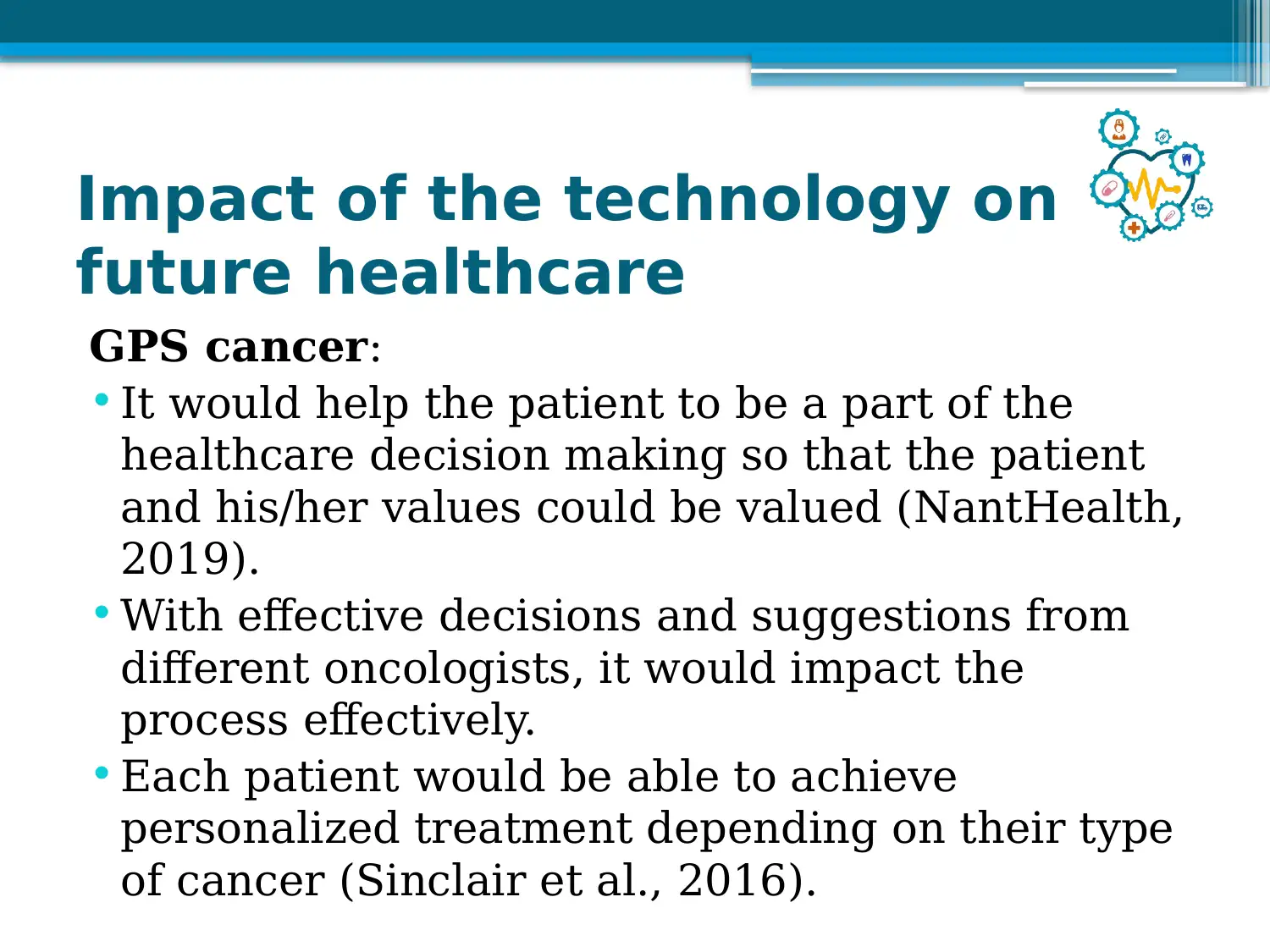
Impact of the technology on
future healthcare
GPS cancer:
• It would help the patient to be a part of the
healthcare decision making so that the patient
and his/her values could be valued (NantHealth,
2019).
• With effective decisions and suggestions from
different oncologists, it would impact the
process effectively.
• Each patient would be able to achieve
personalized treatment depending on their type
of cancer (Sinclair et al., 2016).
future healthcare
GPS cancer:
• It would help the patient to be a part of the
healthcare decision making so that the patient
and his/her values could be valued (NantHealth,
2019).
• With effective decisions and suggestions from
different oncologists, it would impact the
process effectively.
• Each patient would be able to achieve
personalized treatment depending on their type
of cancer (Sinclair et al., 2016).
⊘ This is a preview!⊘
Do you want full access?
Subscribe today to unlock all pages.

Trusted by 1+ million students worldwide
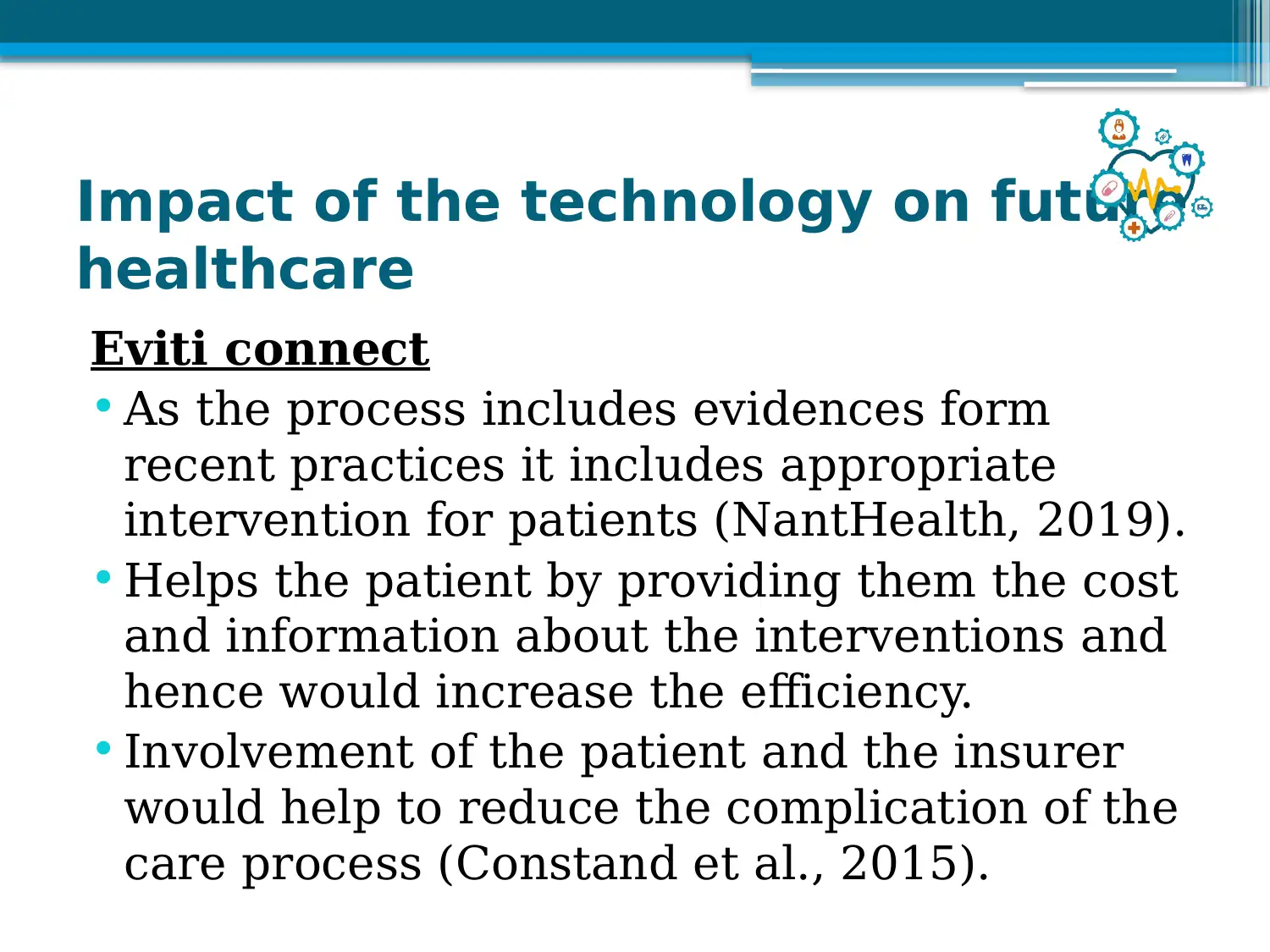
Impact of the technology on future
healthcare
Eviti connect
• As the process includes evidences form
recent practices it includes appropriate
intervention for patients (NantHealth, 2019).
• Helps the patient by providing them the cost
and information about the interventions and
hence would increase the efficiency.
• Involvement of the patient and the insurer
would help to reduce the complication of the
care process (Constand et al., 2015).
healthcare
Eviti connect
• As the process includes evidences form
recent practices it includes appropriate
intervention for patients (NantHealth, 2019).
• Helps the patient by providing them the cost
and information about the interventions and
hence would increase the efficiency.
• Involvement of the patient and the insurer
would help to reduce the complication of the
care process (Constand et al., 2015).
Paraphrase This Document
Need a fresh take? Get an instant paraphrase of this document with our AI Paraphraser
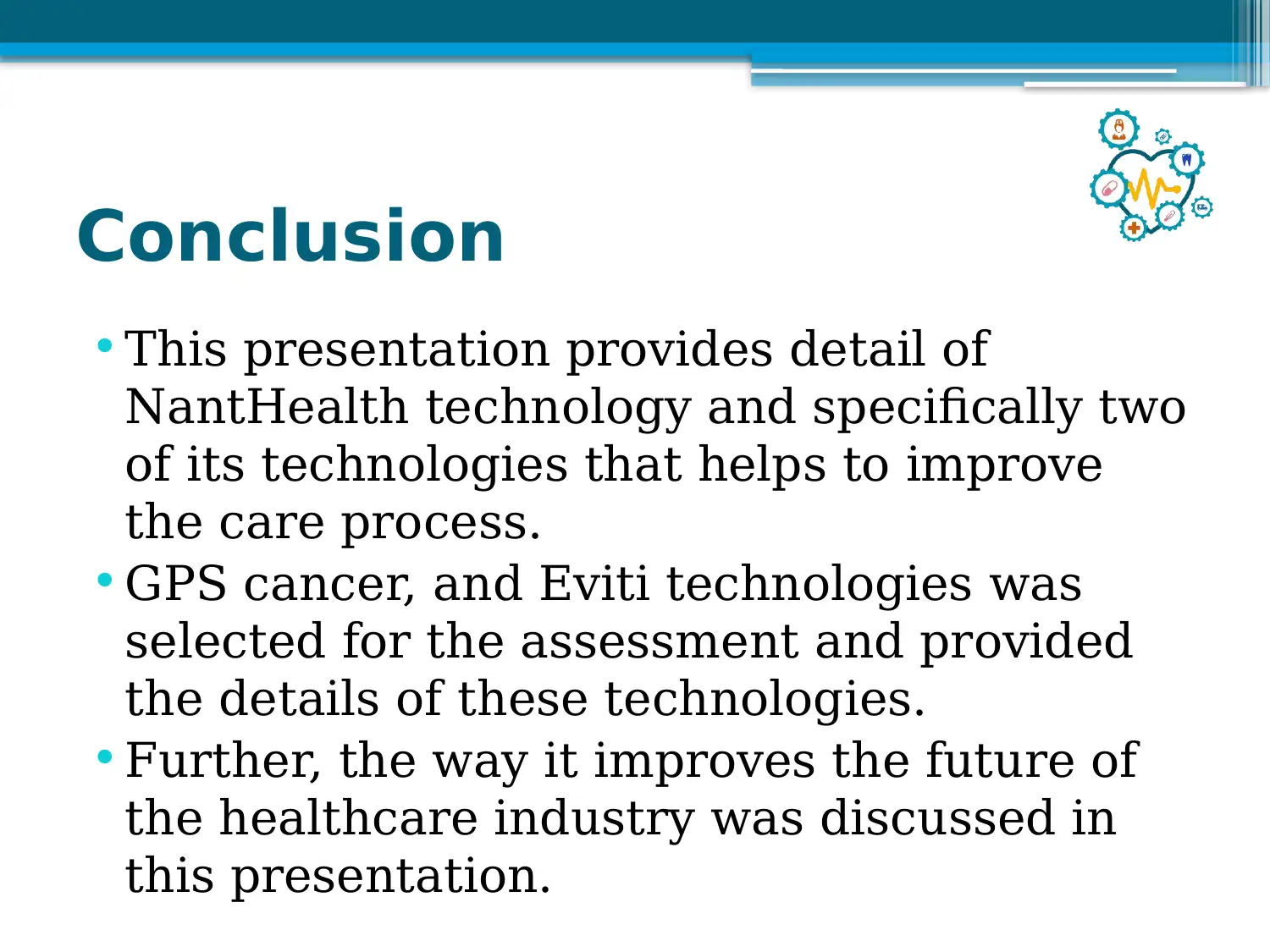
Conclusion
• This presentation provides detail of
NantHealth technology and specifically two
of its technologies that helps to improve
the care process.
• GPS cancer, and Eviti technologies was
selected for the assessment and provided
the details of these technologies.
• Further, the way it improves the future of
the healthcare industry was discussed in
this presentation.
• This presentation provides detail of
NantHealth technology and specifically two
of its technologies that helps to improve
the care process.
• GPS cancer, and Eviti technologies was
selected for the assessment and provided
the details of these technologies.
• Further, the way it improves the future of
the healthcare industry was discussed in
this presentation.
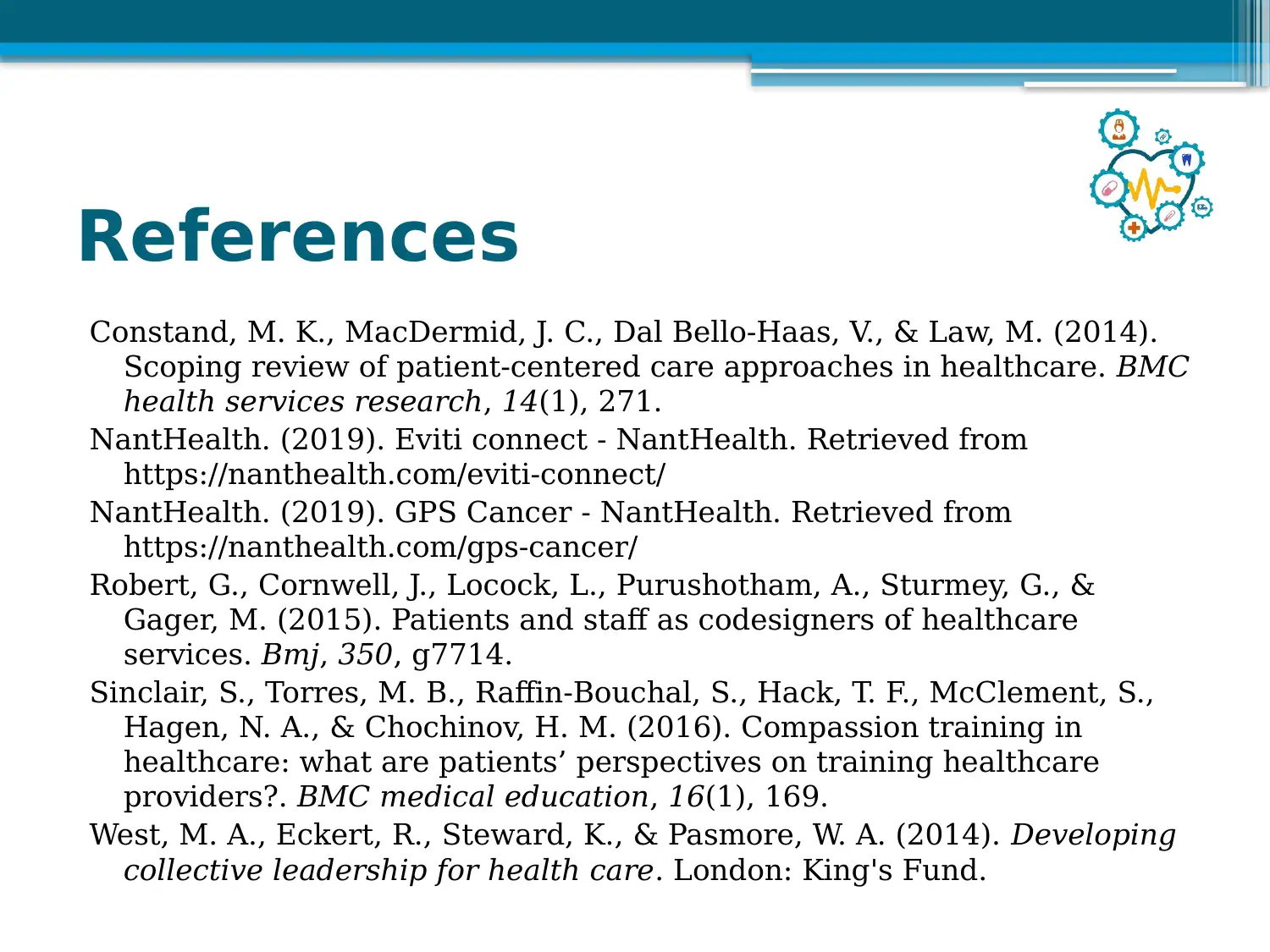
References
Constand, M. K., MacDermid, J. C., Dal Bello-Haas, V., & Law, M. (2014).
Scoping review of patient-centered care approaches in healthcare. BMC
health services research, 14(1), 271.
NantHealth. (2019). Eviti connect - NantHealth. Retrieved from
https://nanthealth.com/eviti-connect/
NantHealth. (2019). GPS Cancer - NantHealth. Retrieved from
https://nanthealth.com/gps-cancer/
Robert, G., Cornwell, J., Locock, L., Purushotham, A., Sturmey, G., &
Gager, M. (2015). Patients and staff as codesigners of healthcare
services. Bmj, 350, g7714.
Sinclair, S., Torres, M. B., Raffin-Bouchal, S., Hack, T. F., McClement, S.,
Hagen, N. A., & Chochinov, H. M. (2016). Compassion training in
healthcare: what are patients’ perspectives on training healthcare
providers?. BMC medical education, 16(1), 169.
West, M. A., Eckert, R., Steward, K., & Pasmore, W. A. (2014). Developing
collective leadership for health care. London: King's Fund.
Constand, M. K., MacDermid, J. C., Dal Bello-Haas, V., & Law, M. (2014).
Scoping review of patient-centered care approaches in healthcare. BMC
health services research, 14(1), 271.
NantHealth. (2019). Eviti connect - NantHealth. Retrieved from
https://nanthealth.com/eviti-connect/
NantHealth. (2019). GPS Cancer - NantHealth. Retrieved from
https://nanthealth.com/gps-cancer/
Robert, G., Cornwell, J., Locock, L., Purushotham, A., Sturmey, G., &
Gager, M. (2015). Patients and staff as codesigners of healthcare
services. Bmj, 350, g7714.
Sinclair, S., Torres, M. B., Raffin-Bouchal, S., Hack, T. F., McClement, S.,
Hagen, N. A., & Chochinov, H. M. (2016). Compassion training in
healthcare: what are patients’ perspectives on training healthcare
providers?. BMC medical education, 16(1), 169.
West, M. A., Eckert, R., Steward, K., & Pasmore, W. A. (2014). Developing
collective leadership for health care. London: King's Fund.
⊘ This is a preview!⊘
Do you want full access?
Subscribe today to unlock all pages.

Trusted by 1+ million students worldwide
1 out of 13
Related Documents
Your All-in-One AI-Powered Toolkit for Academic Success.
+13062052269
info@desklib.com
Available 24*7 on WhatsApp / Email
![[object Object]](/_next/static/media/star-bottom.7253800d.svg)
Unlock your academic potential
Copyright © 2020–2026 A2Z Services. All Rights Reserved. Developed and managed by ZUCOL.





